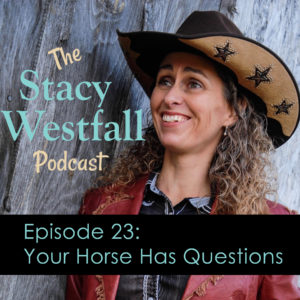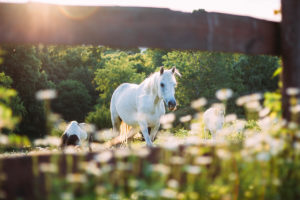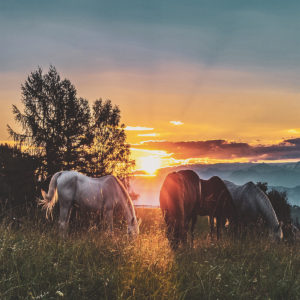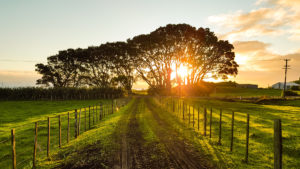Episode 23: Your Horse Has Questions

Subscribe and never miss an episode! (I listen in the barn and when I’m out driving)
Subscribe For Free!
I’m explaining something that was a game-changer for me and my horse. When I share this topic with people at clinics, I see an instant change in them and their horse. Did you know that your horse is always asking you questions? Watching horses in the wild, you see them ask each other questions about leadership. They also do the same thing with you.
The good news is that once you understand that a change in your horses body language is him asking you a questions, you can answer those questions and even have conversations with your horse. Horses questions progress with their training levels, and this is where things really begin to get fun.
“Horses in the herd are often asking questions about leadership.” Stacy Westfall Click To TweetShow Notes
[01:28] Your horse asks you questions with body language. The questions can look like things like a break of gait, diving in, pulling out, or reversing direction.
[01:43] A lot of questions are happening when the horses are doing different things with their bodies.
[01:54] Around the age of four, children ask about 73 questions a day.
[02:07] Horses also ask a lot of questions, and it can feel overwhelming to people.
[03:42] Sometimes people think after training, horses aren’t going to have any questions, but they do.

[04:18] Keep in mind that the quality of your horses questions change as the training level changes.
[04:32] Number one: Your horse is going to ask questions about leadership.
[04:40] Number two: These questions will reveal his temperament.
[04:48] Number three: The questions he asks are going to reveal his training level.

[05:25] When a horse offers to bite you, it’s asking the question of what if I bite you.
[06:22] Their questions also reveal a lot about their temperament.
[08:23] Think about horse training as a bell curve. Put elementary school on one side and college on the other. It’s like climbing a mountain.
[09:26] Questions in the beginning will be more challenging. Somewhere along the line when things get more advanced, your horses become really fun.

[14:17] Playing a game of hot or colder requires you and the horse to have a conversation.
[15:46] The coolest things happen when you and the horse are having a conversation.
[16:22] Instead of everybody feeling like it’s right or wrong or good or bad, it’s just a conversation. Things get so fun when you and the horse have this type of awareness in your bodies.
[17:13] In the beginning, horses will have big questions that you need to have big answers to.
[17:44] Any areas that you don’t have answers for will be the areas your horse has the most questions about.
“You can tell a lot about what horses think by the questions they ask. They are also revealing their training level.” Stacy Westfall Click To TweetLinks and Resources:
2 Comments
Leave a Comment
SUBSCRIBE TO THE PODCAST HERE:





YOURS FREE
WHY IS MY HORSE...?





What does my horse’s anxiety in the arena say about our relationship? What questions might she be asking that I am not answering? Thanks!
My daughter and I are new to riding and have been taking lessons for almost a year. This summer we bought a pony who has just enough attitude to push us to learn. Looking at her attitude as her asking questions has opened up a whole new way of understanding what she is doing and how we can respond better and clearer to her.